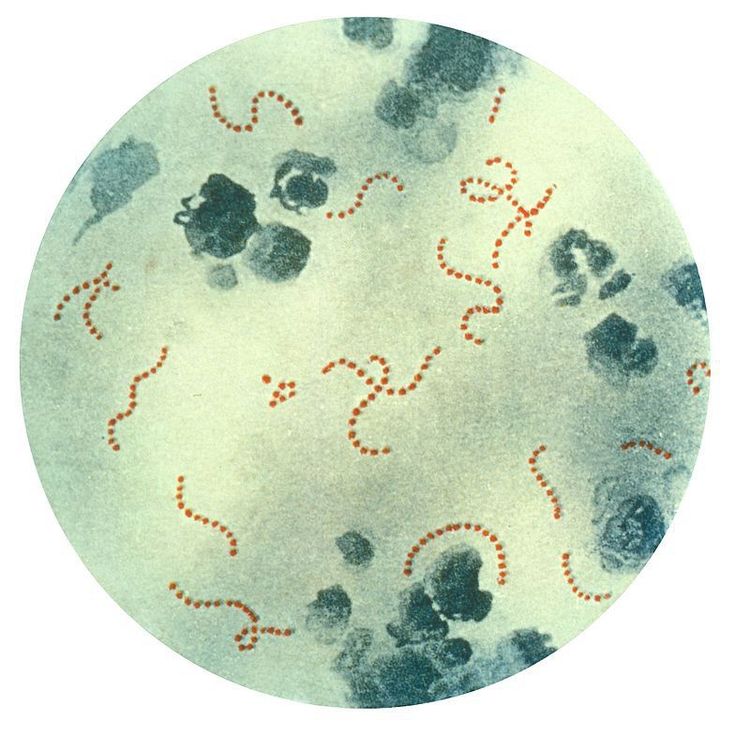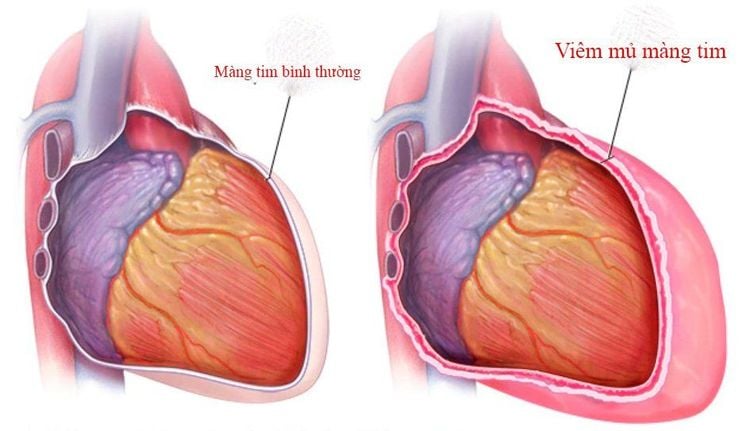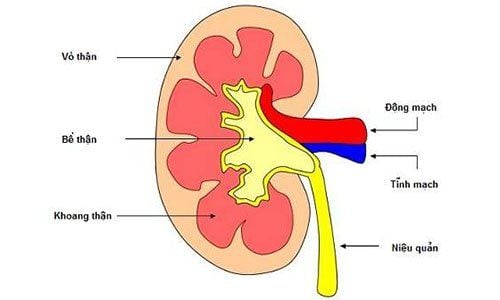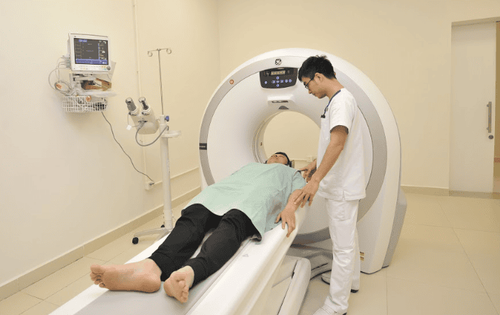This is an automatically translated article.
The article was professionally consulted by Doctor General Internal Medicine Doctor - Department of Medical Examination & Internal Medicine - Vinmec Hai Phong International General Hospital.
Rheumatic heart disease damages, causes myocarditis, inflammation of the endocardium, which can leave severe sequelae such as disability or even death for the patient. Therefore, early recognition of symptoms and timely intervention for treatment of rheumatic heart disease is extremely important.
1. What is rheumatic heart disease?
Rheumatic fever, also known as acute rheumatic fever or rheumatic fever, is an acute inflammatory disease of systemic nature. This is a clinical form of autoimmune disease, ie the body produces antibodies against its own organs and organizations. The disease occurs after one or more episodes of pharyngitis or dermatitis, sinusitis, tonsillitis caused by group A hemolytic streptococcus. In Vietnam, the rate of rheumatic heart disease in children under 16 years old is 0.45%.
Manifestation of the disease is a syndrome including polyarthritis, heart inflammation, erythema ring, appearance of granules under the skin,... Rheumatic heart disease can cause many complications and dangerous sequelae if not detected. detect and treat promptly. At that time, the disease easily causes damage to the heart valves, causing stenosis, regurgitation or stenosis of the heart valve. In addition, other complications of the disease include myocarditis, pericarditis, heart failure and complications in the brain, kidneys,...

2. Symptoms of rheumatic heart disease
2.1 Clinical symptoms Clinical manifestations of rheumatic heart disease usually occur 2 - 4 weeks or longer after the patient is infected with group A streptococcus. Symptoms may appear independently or in combination. together. Specifically:
Pharyngitis : Common 1-2 weeks before. On the whole body, the patient has symptoms of mild fever or high fever of 38 - 40°C, fatigue, loss of appetite, may be accompanied by cough, chest pain,...; In the joints, in the typical form: There are signs of arthritis including swelling, heat, redness, pain in the joints and limited range of motion. Patients often have polyarthritis and inflammation in the large joints. Especially the symptoms of arthritis are transitional, when one joint reduces pain and swelling, pain occurs in another joint. The duration of inflammation of each joint usually lasts 3-7 days, maximum no more than 1 month; Myocarditis: The most common lesion in rheumatic heart disease with chest pain in front of the heart, arrhythmia, heart palpitations, body fatigue, pale skin,... In people with severe myocarditis , there may be symptoms of acute heart failure with symptoms of shortness of breath, cyanosis of the mucous membranes, edema, little urination, ... easy to die; Endocarditis (endocarditis): If rheumatic heart disease is not treated promptly and aggressively, a few weeks after myocarditis, the patient can develop endocarditis. This condition easily leads to valvular sequelae such as mitral regurgitation, mitral stenosis and aortic regurgitation; Pericarditis: Uncommon, often with a small amount of effusion, if corticosteroids are used, the effusion will be reduced and after it heals, there will be no sequelae. Symptoms of pericarditis include chest pain, shortness of breath, small tachycardia,...;

Generalized cardiomyopathy: An inflammatory lesion that occurs in the myocardium, endocardium, and pericardium. Generalized heart inflammation is common in children under 7 years old, if not treated early and aggressively, the disease can lead to severe heart failure and rapid death; Meynet's granules on the skin: Are hard seeds the size of peas or corn kernels, painless to the touch, distributed around joints or along the spine, lasting from 1-2 weeks to 1-2 months and then disappearing; Erythema and erythema on the skin, arranged in a halo with a border diameter of 1 - 2mm, common on the flanks, trunk, proximal extremities and not on the face; usually disappears after a few days; Neurological symptoms: Chorea is an involuntary rapid movement that increases with emotion and disappears during sleep or when concentrating on something else. Chorea can appear in the limbs, half of the body or the whole body, which can go away after 4-6 weeks; Other symptoms: Pneumonia, acute hepatitis, glomerulonephritis and vascular lesions,...

2.2 Subclinical symptoms Blood tests: The blood count shows increased white blood cells, increased erythrocyte sedimentation rate; increased fibrinemia, increased protein C, elevated Antistreptolysin O > 200 Todd units. These indexes increased much after infection with group A hemolytic streptococci after 2 weeks, lasted for about 3 - 5 weeks and then gradually decreased; Cardiopulmonary scan: Enlarged heart, dark hilum,...; Electrocardiogram: Common atrioventricular - ventricular block I, may have AV block - second and third degree, sinus tachycardia, ventricular extrasystoles, atrial extrasystoles,...; Echocardiography: HoHL, HoC images and possibly pericardial fluid,...
3. How to cure rheumatic heart disease?
3.1 Principles of treatment Treat symptoms of rheumatic heart disease; Treat the cause of rheumatic heart disease; Prevention of recurrent rheumatic heart disease. 3.2 Specific treatment Treatment of rheumatic fever includes: rest, use of antibiotics, anti-inflammatory and symptomatic treatment. Specifically:
Rest: People without heart inflammation can stay in bed for 2 weeks and walk around in the room for 2 weeks; People with heart inflammation, the heart is not enlarged should rest in bed for 4 weeks and walk around in the room for 4 weeks; People with heart inflammation, enlarged heart should rest in bed for 6 weeks and walk around in the room at 6 weeks; People with heart inflammation, heart failure should rest in bed until the heart failure is over and rest and walk in the room for another 3 months; Use of antibiotics: Can inject Benzathine Penicillin or take Penicillin V or take Erythromycin according to the dose prescribed by the treating doctor; Anti-inflammatory: Use drugs according to disease severity: People with only polyarthritis can use Aspirin with appropriate dosage; Patients with only heart inflammation should use Prednisolone in appropriate doses. In case the patient has inflammation of the heart and joints, it is necessary to combine these two drugs as prescribed by the doctor; Symptomatic treatment: Use cardiac drugs (Digoxin), diuretics (Furosemide), vasodilators (coversyl, renitec, or captopril), chorea drugs (Phenobarbital, Haloperidol, Clopromazine) at the dose prescribed by the doctor. doctor.

4. Caring for patients with rheumatic heart disease
In addition to strictly following the principles of rheumatic heart disease treatment, relatives need to pay attention to properly care for the patient to recover soon. Some important notes include:
If the patient has shortness of breath, cyanosis, edema due to heart failure, especially after strenuous activities such as stairs, manual labor, ... need to notify immediately to doctors and patients with absolute bed rest to reduce the body's need for oxygen and nutrients; Give the patient light snacks and easy-to-digest foods such as milk and fish. The patient should be given a light meal and limited water intake; The patient's room must be quiet, cool and fully furnished; For children with rheumatic heart disease, the child can be put in the Fowler position (half lying half sitting) in case of difficulty breathing, the mucous membranes are purple to reduce the amount of blood stagnation in the lungs; During the period of taking diuretics and Digoxin, patients should eat more potassium-rich fruits; Patients with chest pain due to heart inflammation should be given absolute bed rest; If the patient has joint pain, swelling, heat, redness due to arthritis, difficulty in movement or at the request of the doctor, it is necessary to lie down in a relaxed position, reduce joint capsule tension and limit joint movement. lowest. The patient should be instructed on how to walk and exercise to relieve pain; Patients need to persevere in taking medications as prescribed by the doctor, including anti-inflammatory drugs, vitamins of group B (B1, B6, B12), sedatives, antihistamines; If the patient has a fever, sore throat due to inflammation in the throat or tonsils, it is necessary to regularly monitor by measuring body temperature. Antipyretic drugs should be used when the body temperature rises above 38.5°C. At the same time, patients need to regularly clean their teeth, avoid colds and eat enough nutrients to improve the body's resistance; Preventing disease recurrence by vaccination as prescribed by the doctor.

When detected early and treated promptly and properly, rheumatic heart disease can be completely cured. In case of late detection and incorrect treatment, it can easily lead to severe heart failure, even death. Therefore, when there are warning symptoms of rheumatic heart disease, patients should go to medical facilities for examination, diagnosis and treatment as soon as possible.
At Vinmec International General Hospital, there is a team of Cardiologists who are experienced specialists, well-trained in the diagnosis and treatment of diseases related to the circulatory system. . In addition, Vinmec has a system of modern and advanced medical equipment, professional service quality, and the best support for diagnosis and treatment results.
Please dial HOTLINE for more information or register for an appointment HERE. Download MyVinmec app to make appointments faster and to manage your bookings easily.













